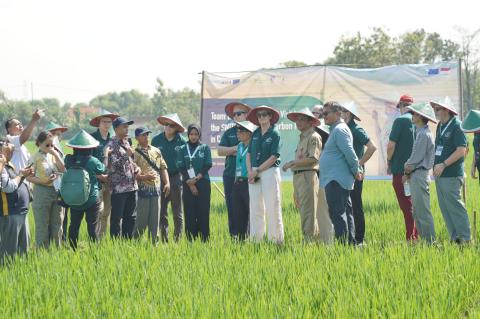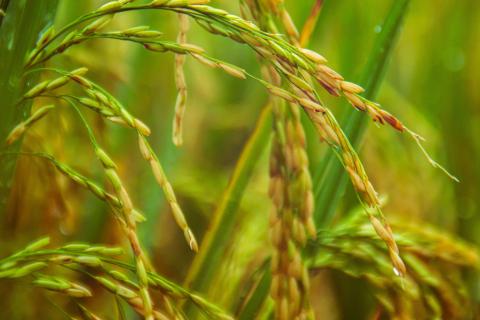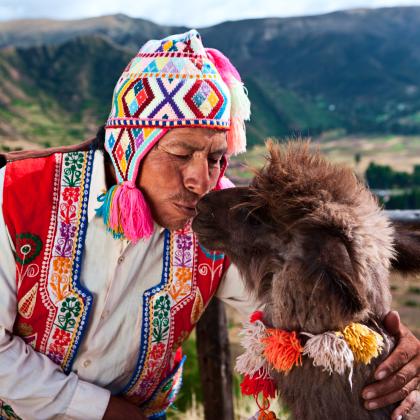system_main_block
您知道减缓气候变化和恢复生态系统是人类面临的两大主要挑战吗?
生态系统恢复和气候相关倡议是我们星球可持续发展的关键。生态系统退化和气候变化是世界面临的两大威胁。成功应对这两大威胁迫在眉睫,需要采取具有长期目标的弹性方法。
了解我们的相关服务: | 碳项目 验证/鉴定服务 | 生态系统恢复
恢复退化的生态系统:由于城市化、集约农业和自然资源开采等人类活动,森林砍伐和生态系统退化的情况继续加剧。根据生态系统恢复方面的国际趋势和规定,遵循良好做法并全面考虑环境和社会方面是成功改善和恢复生态系统的关键。
碳足迹管理: 阻止气候变化的主要国际目标是减少温室气体排放(GHG)。国际社会公认,自工业革命以来,大气中的温室气体浓度急剧增加,导致温室效应加剧,进而引起气候变化。
碳项目/碳清除:国际上公共和私营部门对气候变化的认识促进了碳市场的建立,碳市场用于评估气候变化缓解举措,并量化其对减少温室气体的贡献。在这一领域,土地利用管理发挥着重要作用。由于光合作用,生态系统具有从大气中清除二氧化碳的潜力。这些举措(碳项目)需要强有力的方法、监测方式和质量保证程序。
碳意识:公共和私营部门乃至整个社会都开始意识到气候变化,从而对了解碳足迹和 如何管理碳足迹兴趣日益浓厚。私营部门需要标准、工具和程序来计算和减少碳足迹,以达到减缓气候变化的目的。
有哪些挑战?
我们的地球和人类面临的主要威胁是生态系统退化和气候变化。我们面临着两个紧迫而严峻的挑战:恢复退化的生态系统和减缓气候变化。虽然减少温室气体排放至关重要,但增加温室气体清除量也同样重要,而生态系统在这一过程中发挥着至关重要的作用。采取有效措施恢复退化的土地,对于创造一个人类与自然和谐共处的更健康的地球至关重要。
为有效恢复生态系统,世界需要监测与评估
联合国生态系统恢复十年强调了生态系统恢复在阻止生物多样性丧失、应对变化以及其他广泛的社会挑战方面的重要性。世界已经设定了一个目标——到 2030 年保护至少 30%的土地和水域,而这一时限即将到来。
现在是自然保护和恢复的关键时刻。我们迫切需要有效监测的影响并且分享生态系统恢复项目的成果。
Read more
views_block:newsroom-block_9
views_block:impact_component_block-block_2
人类影响
870,000+
确保农民、工人和土地管理者的福祉、人权和文化遗产得到保护。
自然影响
3 240 万
通过使用可持续发展标准保护3260万公顷土地的自然和环境免受退化和转换。
气候影响
32,000+
减少超过3.2万吨二氧化碳的排放,降低对气候的影响。
有问题?联系我们
我们的目标是推动变革,影响生态系统恢复和气候变化减缓活动。我们经验丰富的专业人员通过采用最佳实践和最佳方法来指导这些活动的实施,从而取得长期成功的结果,并对环境和社会产生积极影响。这些专家在实地工作以及参与生态系统恢复和气候变化减缓活动的过程中积累了丰富的实践知识。如果您有任何问题,请随时联系我们。
Pablo Rodríguez-Noriega Alonso
Climate and Restoration Programme Leader
prnoriega@preferredbynature.org
views_block:read_about_other_commodities-block_1
生物质
生物质对于可持续发展、减少碳排放和提供可再生能源至关重要。生物质能利用率的不断提高凸显了它在应对气候变化和促进各行各业可持续发展方面的重要性。
了解更多
牛
牛虽然对粮食安全至关重要,但也会导致森林砍伐和气候变化。需要集中力量推广可持续的做法,以提高生物多样性、土壤健康和人畜福祉。
了解更多
气候
应对气候变化是可持续发展的当务之急。通过创新战略减少温室气体排放对减轻气候变化的影响至关重要。
了解更多
可可
可可种植影响着全球的环境、经济和气候。农林业等可持续做法可以减轻其负面影响,从而使可可与减缓气候变化相关联。
了解更多
咖啡
平衡经济可持续性与负责任的生产实践对咖啡业至关重要。既要适应气候变化,又要满足不断增长的全球需求,这对咖啡的可持续生产至关重要。
了解更多
生态系统
振兴生态系统对地球的健康和保护至关重要。以可持续的方式遏制森林砍伐和退化,可确保生态系统的长期恢复。
了解更多
棕榈油
棕榈油生产支持经济发展,但也引发了环境和社会问题。可持续的生产方式对于解决森林砍伐和劳工权利等问题至关重要。
了解更多
水稻
水稻生产对气候和自然有重大影响。解决水稻种植过程中的排放、用水和森林砍伐问题可以带来积极的环境变化。
了解更多
橡胶
天然橡胶是工业的必需品,但会导致森林砍伐和生物多样性丧失。解决工作条件恶劣等可持续发展问题对橡胶生产至关重要。
了解更多
大豆
大豆在全球粮食安全和生物燃料生产中发挥着至关重要的作用。强调可持续增长对于应对大豆种植业面临的环境挑战至关重要。
了解更多
木材
木材会对人类、自然和气候产生全球性影响,因此需要进行可持续管理。森林对生物多样性以及水土保持至关重要。
了解更多
旅游业
旅游业的可持续发展与环境保护和文化保护息息相关。负责任的消费和对当地社区的支持对可持续旅游至关重要。
了解更多
其他
我们的使命不仅限于这些重点领域,还包括任何具有可持续影响潜力的作物或产品。我们支持世界各地的保护和生态系统恢复项目,帮助企业适应不断变化的法规。
了解更多
认证
加强贵组织对可持续发展的承诺,展示具有影响力的业务转型。
可持续性咨询服务
我们的专家在可持续发展领域拥有 30 多年的经验,可以帮助您加强可持续发展之旅。
专家课程
通过我们的计划、特定项目课程或根据要求定制的课程,参与具有影响力的培训体验。
block_content:d7391b6f-991e-483f-8f5a-d26f635d27fb
block_content:94b41a32-a90c-4997-a533-ad66f6283cff
field_block:block_content:basic:body







